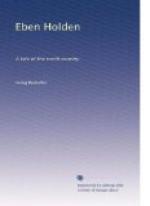Then a young man came to the platform and recited, after which Hope went forward and sang ‘The Land o’ the Leal’ with such spirit that I can feel my blood go faster even now as I thank of it, and of that girlish figure crowned with a glory of fair curls that fell low upon her waist and mingled with the wild pink roses at her bosom. The fiddler sat quietly as if he heard nothing until she began to sing, when he turned to look at her. The elder announced, after the ballad, that he had brought with him a wonderful musician who would favour them with some sacred music. He used the word ‘sacred’ because he had observed, I suppose, that certain of the ‘hardshells’ were looking askance at the fiddle. There was an awkward moment in which the fiddler made no move or sign of intelligence. The elder stepped near him and whispered. Getting no response, he returned to the front of the platform and said: ’We shall first resign ourselves to social intercourse and the good things the ladies have provided.’
Mountains of frosted cake reared their snowy summits on a long table, and the strawberries, heaped in saucers around them, were like red foothills. I remember that while they were serving us Hope and I were introduced to one Robert Livingstone — a young New Yorker, stopping at the inn near by, on his way to the big woods. He was a handsome fellow, with such a fine air of gallantry and so trig in fashionable clothes that he made me feel awkward and uncomfortable.
‘I have never heard anything more delightful than that ballad,’ he said to Hope. ’You must have your voice trained — you really must. It will make a great name for you.’
I wondered then why his words hurt me to the soul. The castle of my dreams had fallen as he spoke. A new light came into her face — I did not know then what it meant.
‘Will you let me call upon you before I leave — may I?’ He turned to me while she stood silent. ‘I wish to see your father,’ he added.
‘Certainly,’ she answered, blushing, ’you may come — if you care to come.
The musician had begun to thrum the strings of his violin. We turned to look at him. He still sat in his chair, his ear bent to the echoing chamber of the violin. Soon he laid his bow to the strings and a great chord hushed every whisper and died into a sweet, low melody, in which his thought seemed to be feeling its way through sombre paths of sound. The music brightened, the bow went faster, and suddenly ‘The Girl I Left Behind Me’ came rushing off the strings. A look of amazement gathered on the elder’s face and deepened into horror. It went from one to another as if it had been a dish of ipecac. Ann Jane Foster went directly for her things, and with a most unchristian look hurried out into the night. Half a dozen others followed her, while the unholy music went on, its merry echoes rioting in that sacred room, hallowed with memories of the hour of conviction, of the day of mourning, of the coming of the bride in her beauty.




